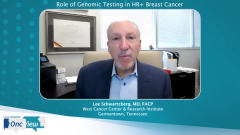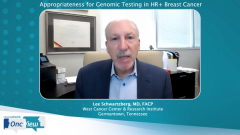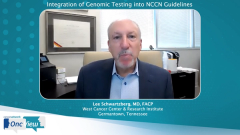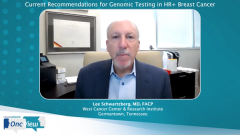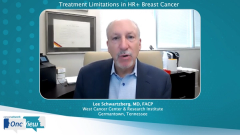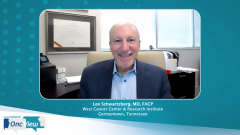
Role of Genomic Testing in HR Positive Breast Cancer
Lee Schwartzberg, MD, FACP, of West Cancer Center & Research Institute, discusses the role of genomic testing in hormone receptor-positive breast cancer and compares information provided by various assays approved for use.
Episodes in this series

Kristie Kahl: So Dr. Schwartzberg, what are the genomic assays and what is their role in early breast cancer?
Lee Schwartzberg, MD, FACP: The third aspect of looking at factors that will help us determine prognosis and predict a value in adjuvant therapy for breast cancer are the newer genomic assays. Newer in the sense that they’ve now been around for about 15 years and are used quite broadly. These assays look at an expression panel of genes in the tumor. This is not germane, of course. This is looking at the tumor and the expression panel. They were originally done with arrays of mRNA, or messenger RNA, which shows the expression of each of those genes. And either using a panel type of technology or using PCR [polymerase chain reaction] technology for the specific genes that would determine we can get a score of whether a particular tumor is low-, intermediate-, or high-risk for recurrence. Now, we have several different types of genomic assays or commercial assays that are available. Interestingly, they all use a different gene set to come to these decisions. All of them are validated. They are very good at prognosis in terms of telling whether a patient’s tumor and typically combined with the clinical features that I mentioned already, will be low-risk, intermediate-risk, or high-risk for recurrence of disease. Initially, these assays were established for node-negative patients.
Recently, we have had prospective studies looking in the node-negative or in the node-positive setting how well these assays predict for a recurrence of disease or not. These assays are also important to help us make a decision about chemotherapy up front. The 21-gene assay and the 70-gene assay have been looked at prospectively and give us information about the benefit of chemotherapy in those people that have low-, intermediate-, or high-risk scores. What we find is those with high scores benefit from chemotherapy in that setting whether they are node-negative or node-positive. So, that has become the standard for helping make the decision about chemotherapy in many patients with early-stage breast cancer. As I mentioned before, we do not use genomic expression profiles to make a decision about adjuvant endocrine therapy because we essentially offer that to any patient who is hormone receptor-positive.
Transcript edited for clarity.
Newsletter
Stay up to date on recent advances in the multidisciplinary approach to cancer.


